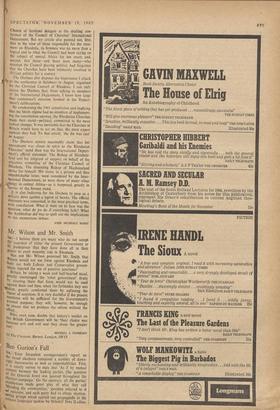Sia, — The Duchess of Hamilton appears neither to have listened to
what the Archbishop of Canterbury' actually said in the Aberdeen debate, nor to have read with any attention my article in the Sunddy Tittles putting his remarks into context. Of course many people sincerely doubt whether Church should ever commend the use of force. MY article pointed out this dilemma as it affected the Church of Scotland delegate at the drafting con- ference of the Council of Churches' International Department. But my article also pointed out, first, that in the view of those responsible for the state- ment on Rhodesia, its firmness was no more than a logical end to what the Council had been saying on the subject of central Africa for ten years; and, second, that these—and there were many—who resented the Council playing politics, had forgotten that the Churches have been intimately involved in African politics 'for a century. The DuChess also disputes the importance I attach to the conference .in Salisbury in August, organised by the Christian Council of Rhodesia. I can only assure the Duchess that from talking to members of the International. Department. I know how large that conference's outcome loomed in the Depart- nient'S deliberations. By condemning 'the 1961 constitution and implying that the Smith regime had no intention of implement- ing the constitution anyway..the Rhodesian Churches made their stand—political, committed to the most radical changes. It was inevitable that the Churches in Britain would have to act on that, the most expert opinion they had. To that extent, 'the die was cast' in August. The Duchess cannot reasonably claim that her amendment was closer in spirit to the Rhodesian Churches' stand than was the International. Depart- ment's official statement. The .Bishop of Matabele- land sent his telegram of support on behalf of the . executive committee' of the Christian Council of Rhodesia. The dissenting Bishop of Mashonaland Spoke for himself. His views, in a private and thus unPublishable letter; were considered by the Inter- national Departthent, as were those of many other ;clergy in central Africa—as it happened, greatly in favour of the firmest stand. It is also ludicrous for the Duchess to pose as a solitary dove against a legion of hawks. The official Statement was concerned, in the most practical terms, . with conciliation. What it went on to face was the question, what do we do if everything fails? What the Archbishop did was to spell out the implications of this momentous debate.
JOHN ARCHDALE BARRY



































 Previous page
Previous page